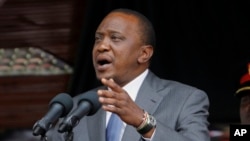Judges at the International Criminal Court agreed Friday to withdraw charges against Kenyan President Uhuru Kenyatta, ending the global war crimes court's highest-profile case before it reached trial but leaving room for it to be revived.
Prosecutors last year asked judges for permission to drop their charges of crimes against humanity against Kenyatta, whom they accused in 2011 of stoking ethnic violence after Kenya's 2007 presidential election.
Failure to sustain the case to trial will call into question the ability of the first permanent global war crimes court to examine the Israeli-Palestinian conflict, as it must now do after the Palestinian Authority joined the court last December.
Prosecutors blamed their failure to put Kenyatta on trial on political interference and massive interference with witnesses, especially after Kenyatta was elected president in 2013.
Kenyatta had rejected the charges, saying that they were trumped up and politically motivated and that the claims of intimidation or bribery of witnesses were a cover for prosecutors' incompetence.
Crucially, the judges did not throw out the charges, leaving prosecutors free to revive them if new evidence emerges. They can also pursue witness intimidation, which counts as contempt of court.
"The court retains jurisdiction over any interference with a witness or with the collection of evidence," the court, based in The Hague, said in a statement.
The court, set up more than a decade ago to hold the most powerful to account for the most serious crimes, has concluded only three cases, convicting two little-known Congolese warlords and acquitting another.
The ICC has proved unable to impose itself in uncooperative countries: Sudanese President Omar al-Bashir remains at large, in office; and Saif al-Islam, son of the late Libyan leader Moammar Gadhafi, is incarcerated in increasingly anarchic Libya.
Kenyatta's deputy, William Ruto, is still on trial at the ICC, facing similar charges. Prosecutors are concentrating on proving that their case against him has been weakened by interference with witnesses.





